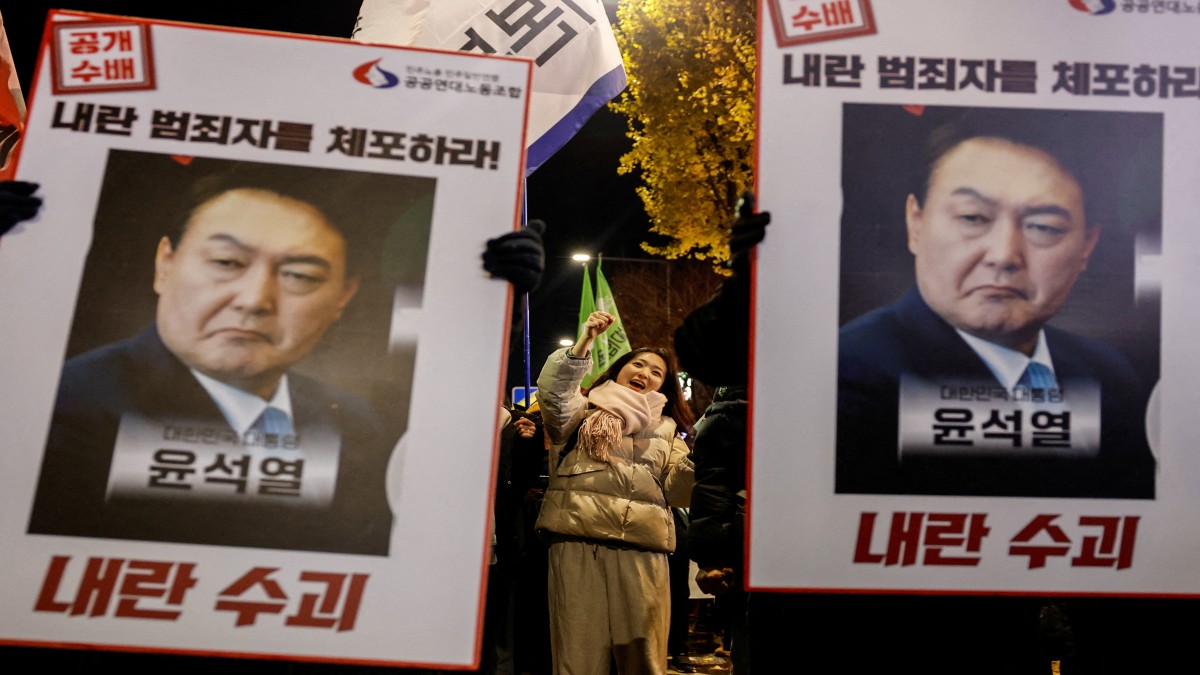Yoon Suk Yeol’s declaration of martial law at night has had far-reaching effects.
In the same national assembly that decided to swiftly lift martial law only six hours after it was implemented , the opposition parties are pushing for a parliamentary vote on Saturday, which might result in the impeachment of the South Korean president .
They are calling Yoon’s short-lived decision an “unconstitutional, illegal rebellion or coup.”
It is difficult to predict how the arch-conservative would fare in the current situation.
Only his resignation seems to be a possible answer to stop him from becoming the second South Korean president to be forced from office since the nation’s democratic transition less than 40 years ago.
But this is not the first time the country has seen a leader fall from grace.
Here’s a look at the shocking downfalls of former leaders of the fourth-largest economy in Asia.
Park Geun-hye: Impeached and jailed
South Korea’s first female president was impeached by Parliament in December 2016 and later imprisoned.
Park, the daughter of the former dictator Pak Chung-hee, had been in office since 2013 and had presented herself as incorruptible.
However, she was accused of receiving or requesting tens of millions of dollars from conglomerates, including electronics giant Samsung. Additional accusations included sharing classified documents, putting artists critical of her policies on a “blacklist,” and dismissing officials who opposed her.
In March 2017, the Constitutional Court confirmed her impeachment. She was given a 20-year prison sentence and steep fines in 2021, but at the end of that year, President Moon Ae-in, her successor, pardoned her.
The current president, Yoon, was a prosecutor in Seoul at the time and was instrumental in her termination and imprisonment.
Also read: Was South Korea’s First Lady behind President Yoon’s decision to impose martial law?
Lee Myung-bak: 15 years in prison
The conservative predecessor of Park, Lee, was in power from 2008 to 2013.
He was sentenced to 15 years in prison in October 2018 for corruption.
He was found guilty of having received around $10 million in illegal funds from Samsung in exchange for favours to the conglomerate’s then chairman, Lee Kun-hee, who had been convicted of tax evasion.
However, his prison term was cut short when he received a pardon from President Yoon in December 2022.
Roh Moo-hyun: Suicide
He had been president from 2003 to 2008 and was seen as a strong supporter of rapprochement with North Korea.
Roh tragically took his own life in 2009 by jumping off a cliff.
He was reportedly under investigation for allegedly receiving bribes from a wealthy shoe manufacturer, totalling $6 million, which was paid to his wife and the husband of one of his nieces.
Chun Doo-hwan: Retired after mass protests
In response to widespread protests, military leader Chun Doo-hwan, dubbed the “Butcher of Gwangju” for ordering his forces to crush a rebellion against his power in the southern city, resigned in 1987.
He handed power to his protégé Roh Tae-woo, whom he had known for decades, having been classmates at the military academy during the Korean War.
But violence and corruption tainted their legacy.
In 1996, the two men were convicted of treason for their roles in the 1979 coup that brought Chun to power, as well as the Gwangju uprising in 1980 and other offences.
Chun was initially sentenced to death, but his sentence was commuted to life in prison.
Roh, on the other hand, was sentenced to 22.5 years in jail, which was later reduced to 17.
Despite their convictions, the duo were granted amnesty in 1998 after serving only two years behind bars.
Park Chung-hee: Assassinated
South Korea’s authoritarian dictator, Park Chung-hee was assassinated on October 26, 1979 by his own spy chief during a private dinner.
The shocking events have been long a subject of heated debate in South Korea, with many questioning whether the murder was premeditated.
In the aftermath of his death, army generals Chun Doo-hwan and Roh Tae-woo seized the opportunity to plot a coup in December 1979, further plunging the country into political turmoil.
Yun Po-sun: Overthrown in a coup
In 1961, President Yun Po-sun was ousted in a military coup orchestrated by army office Park Chung-hee.
Although Yun was initially allowed to remain in office, Park effectively seized control of the government. Park later solidified his power by winning the 1963 election, ultimately replacing Yun as president.
Syngman Rhee: Forced to resign
South Korea’s first president, Syngman Rhee, was elected in 1948.
However, a large-scale student-led uprising in 1960 forced him to step down.
His effort to use rigged elections to prolong his term was the spark for the protests.
Following his resignation, Rhee was exiled to Hawaii, where he died in 1965.
With inputs from AFP
)